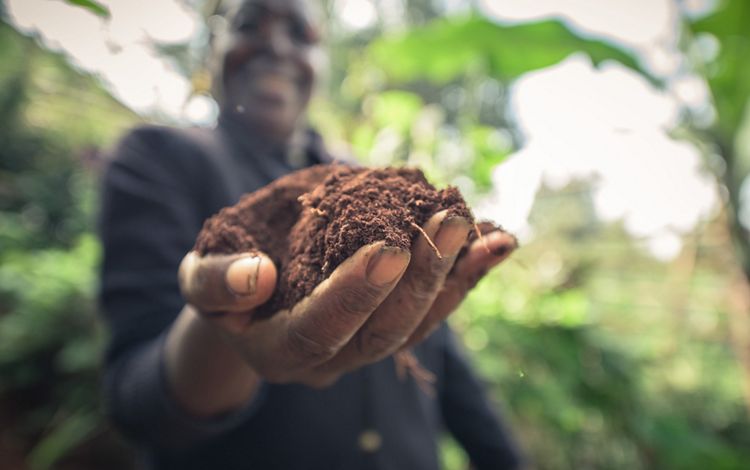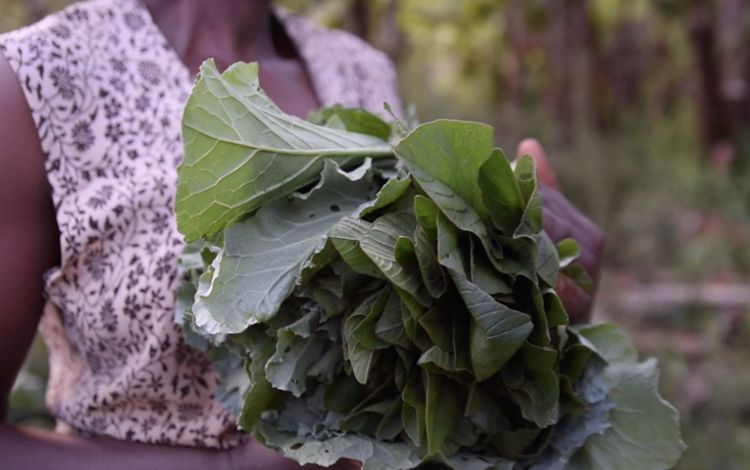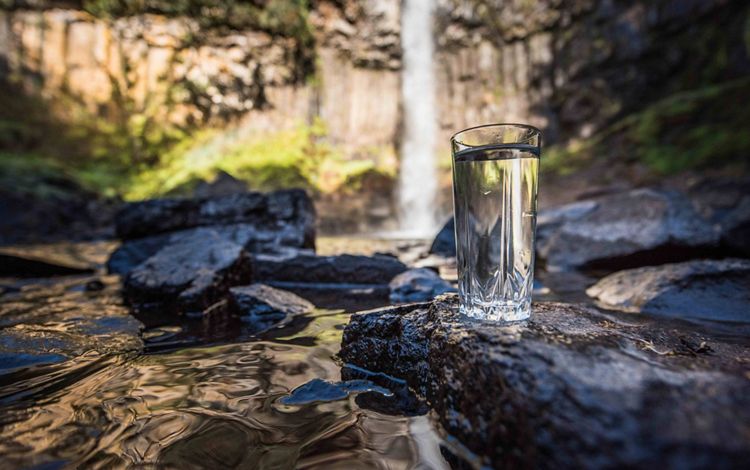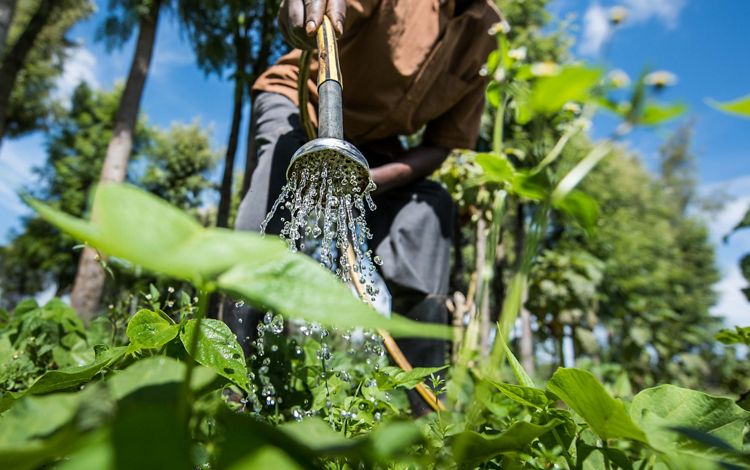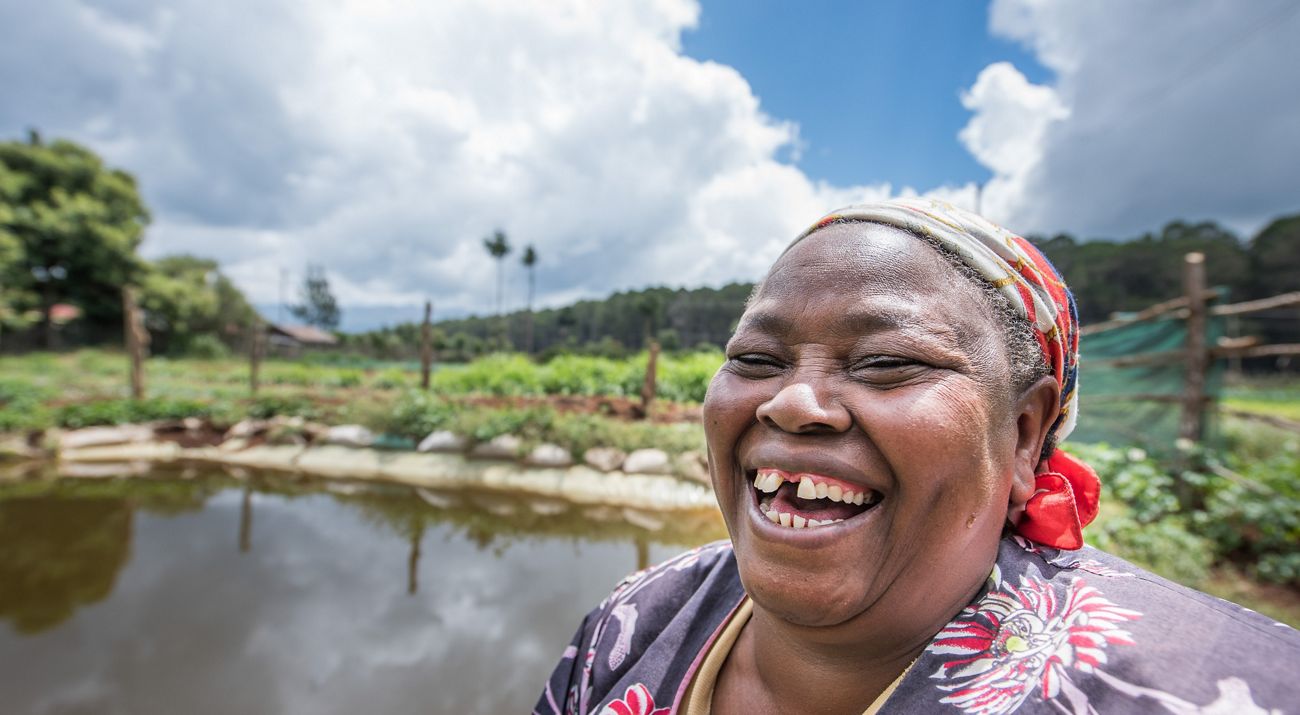
The Weight of Water
Meet the women who are carrying Kenya's water from trees to taps
It’s an iconic sight in rural Africa to see a woman carrying water on her head: Heavy buckets held perfectly vertical with just her strength and balance, both hands free to shake those of passersby, make calls on her phone, or hold on to her child.
But even when she arrives home, the weight of water remains on her shoulders.
In the majority of African households, women spend more time with water than their male counterparts. In rural areas, millions of women spend hours each day walking to a water source. Even in places where water comes from a tap, women are generally responsible for most of its use — from the cooking pot and the dirty dishes to the wriggling children at bath time.
So it is women who are often more acutely aware of the water quality and quantity of the water available to them. For women who are the head of the household, the disproportionate burden grows.
For example, in the Tana River watershed of Kenya, TNC scientists have gathered data showing that female-headed households are more dependent on farming — and therefore on water — for income than are male-headed households in the same area, and the female-headed households have lower food security.
The Nature Conservancy launched the Upper Tana-Nairobi Water Fund to help secure water in and around Nairobi — a city of 4 million people that gets 95 percent of its water from the Tana River. TNC and its Water Fund partners are working with thousands of farming households — one in four of which are headed by women — throughout the watershed to reduce erosion and water use.
In response to the new data, the Water Fund will provide even greater support for female farmers, along with farmers over 60, through a larger subsidy toward the costs of soil and water conservation measures. One such benefit is the construction of a “water pan,” a large, lined pool that captures and stores rainwater for use year-round. Another benefit is terracing on steep slopes, which keeps soils in place for crop growth and out of the waterways.
Ensuring that women can access these water-saving measures is therefore not only socially responsible, it’s smart conservation.
From the slopes of Mount Kenya to crowded Nairobi, meet women who are participating in the Water Fund and doing their part to carry more clean water home for 9 million people.
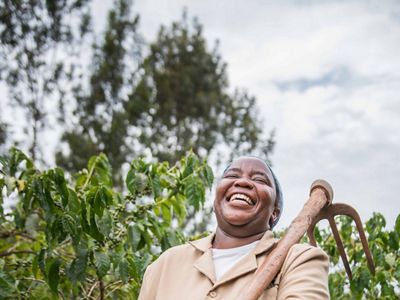
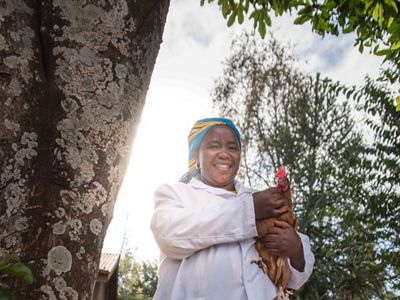
Gladys Wangechi runs a successful coffee, chicken, and pig farm on the banks of the Gura River and was the winner of Kenya’s “Women in Agriculture” Award 2017.
Gladys started with 250 coffee trees that each produced around 3 kilograms of beans. “I couldn’t plant any more trees because of water challenges,” she said. “I didn’t know how to conserve soil and water, so I would lose most of my good soil when it rained. Then I met Sabina [a county agricultural extension officer working for the Water Fund] and learned about terracing, so I added more coffee trees. Slowly, bit by bit, I expanded my farm.”
By terracing and planting soil stabilizing crops, Gladys can now maintain 450 coffee trees that produce an average of 6 kilograms of beans each.
In a two-year process led by the Water Fund partners, Gladys and more than 8,000 other farmers have received Rainforest Alliance Certification (RAC) — an internationally recognized designation awarded to farms, forests, and businesses that meet rigorous environmental and social standards. Those efforts not only protect their soil and keep sediment out of the Tana River, but will earn them higher prices for their coffee.
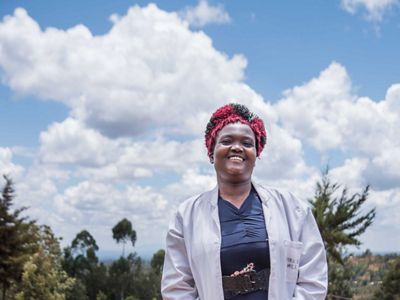
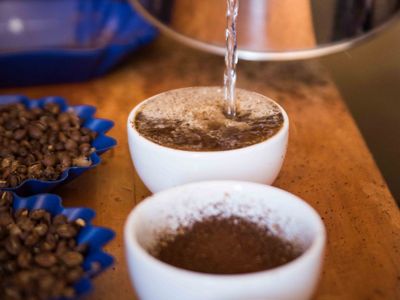
Rose Murage is one of two female managers at the Thunguri Coffee Mill, which became one of eight factories to be awarded Rainforest Alliance Certification (RAC) in 2018 since their supply farmers, including Gladys, met the required soil and water conservation standards.
“Over the past two years, while we have been undergoing the process for RAC with the Water Fund, we’ve noticed a big improvement both in production and in quality of the coffee,” said Rose’s fellow mill manager, Gladys Kariuki. “Last year, the price we got per kilogram of coffee was double what it was in 2015/2016.”
It’s not just coffee farmers who are benefitting from improved farming methods — the Water Fund works with more than 20,000 farmers in the watershed to prevent soil runoff and conserve water.
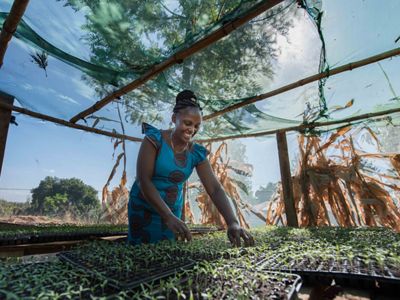
Mercy Wangechi used to rent a riverside farm plot. While it was close to a water source, it was prone to flooding, and she spent a lot on fuel for her irrigation pump. After hearing about rainwater harvesting systems from a neighbor in church, Mercy decided to move her farm to inherited land. In 2014, the Water Fund helped Mercy build and line a 50,000-liter water pan to capture rainwater. By April 2017, she had increased her income enough to expand her water pan to 100,000 liters.
“Last season I planted a variety of tomatoes, and people were coming from all different locations just to see them,” Mercy said. “With the profits I made I bought a car, which is helping me and my husband take tomatoes directly to market. I’m a farmer and a businesswoman!”
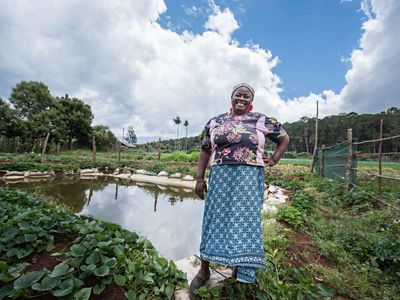
Female-headed households, such as Elena Kinyuna’s small farm on the edge of the Mt. Kenya Forest, are generally more dependent on farming income than male-headed households. With support from the Upper Tana-Nairobi Water Fund, Elena built a rainwater harvesting water pan. Elena discovered that if she put bags of manure in her water pan, she would not only enrich the water for irrigation of her crops, but it would help feed fish that she sells.
“The little idea the Water Fund gave us has grown into something we are doing for our living,” Elena said.
Irene Mumiria lives on a small farm in Maragua, Kenya, with her husband and three children, where she grows and sells vegetables, such as squash, bananas, corn, and green peppers. She struggled to keep her crops irrigated during the dry season, but after the Water Fund provided support for a water pan and showed her how terracing and napier grass could help retain the water in her soil, she was able to start making a profit.
For Carol Nguru, county extension agent, Irene is a great example of how women are taking the lead in conservation. Irene heard about water pans from a farm group meeting, and she took the initiative to start digging until her husband and son joined her.
“What I’ve seen is: If women take the lead in conservation, it happens faster,” Carol said.
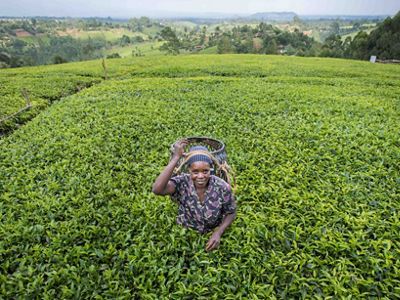
Beatrice Manyua and her husband own a tea plantation in the hills of Othaya, Nyeri County. The 30 kilos of tea leaves she picks per day helps to support her three children, but times get tough during the dry season. To help her maintain her tea and food crops all year-round, Beatrice has excavated a water pan after learning of its benefits from other farmers. She will soon receive a liner — the foundation of a water pan — from the Water Fund.
The Water Fund partners are on course to teach 50,000 farmers about agricultural improvement methods by 2020. How? Amongst other outreach methods, it is tapping in to one of Kenya’s greatest assets – marathon runners
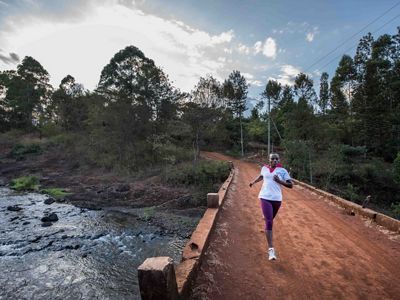
Jane Mbogo is one of four marathon runners currently employed by the Water Fund to help reach farmers and explain the benefits of soil and water conservation. Jane works half-days Monday to Friday, running an average of 28 kilometers a day and visiting up to 15 farms in one morning. Through Jane, farmers learn how the Water Fund could help finance tools such as water pans and drip irrigation kits.
“It helps me get mileage, and it helps farmers to plant,” said Jane, who has just completed a series of marathons in China, placing in the top three in all of them.
The ambitious scale of the Water Fund promises big impacts on the health of the Tana River. To establish baselines upon which to measure this impact, the water fund have teamed up with the Water Resources Authority.
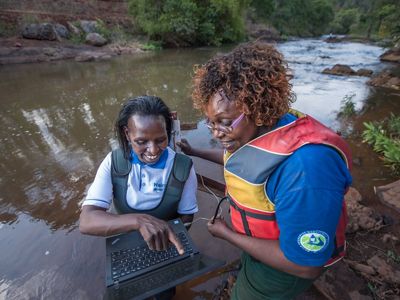
The Water Resources Authority (WRA) is a state corporation responsible for regulating the management of water resources in Kenya. Faith Mbathi and Jane Njoroge are two members of the team responsible for measuring water quality and quantity throughout the Tana watershed, collecting data that ensures the Water Fund can focus limited resources in high-priority areas. The government recognizes the role of women, too: Faith is now one of four women working full time to deliver conservation benefits under the Water Fund.
“The rivers are drying up,” said Jane. “About 10 years ago, some rivers we couldn’t even measure because the flow was too high. Now we can walk across those same rivers. We’re making a difference with the Water Fund because our data is helping to plant trees and advise farmers in the areas where it matters most.”
Already, the work of the Water Fund has reduced the sediment concentration in rivers. Yet regular access to water for many urban dwellers remains a constant challenge.
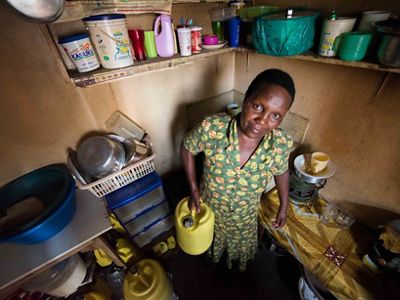
Jacinta Ng’ang’a’s kitchen and bathroom are full of buckets, bottles, and jerry cans. The buckets are heavy, but the mental load of ensuring that her family will have enough water may be heavier. She lives with her husband and two children in a small apartment in Nairobi’s Pangani district. Like her neighbors, Jacinta is scheduled to receive running water from the Nairobi City Water and Sewerage Company three days a week. However, the supply is unreliable, so Jacinta prepares for up to three weeks without it. When supplies run out, she buys water at 50 shillings (50 cents) a liter — a significant expenditure for a soap and tissue paper merchant.
The Water Fund's goal: Women like Jacinta don’t have to work so hard to ensure their families can make it to the next ‘tap day.’ As the city expands both in population and economic importance, reliable water will become an even more critical issue.
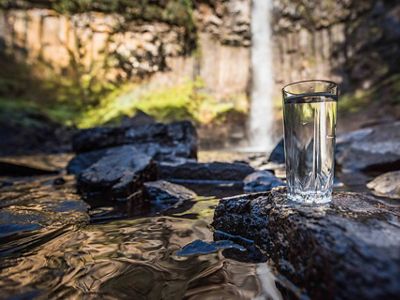
With the success of the Upper Tana-Nairobi Water Fund, our second water fund in Africa is already underway — and once again, we are going the extra mile to empower women to take the lead. In Cape Town, South Africa, a female scientist and 14 local women are helping create a more secure future for a water-starved city.
Our ultimate goal is continental impact. TNC scientists have identified dozens more African cities with the potential for green infrastructure investment to essentially pay for itself. Just like in Nairobi and Cape Town, we expect that women in these cities will be powerful leaders in securing water for future generations.
TNC’s work in the Upper Tana-Nairobi Water Fund and the Greater Cape Town Water Fund has been made possible in part by generous support from the Coca-Cola Foundation’s RAIN Initiative.
The Power of Water Protection
